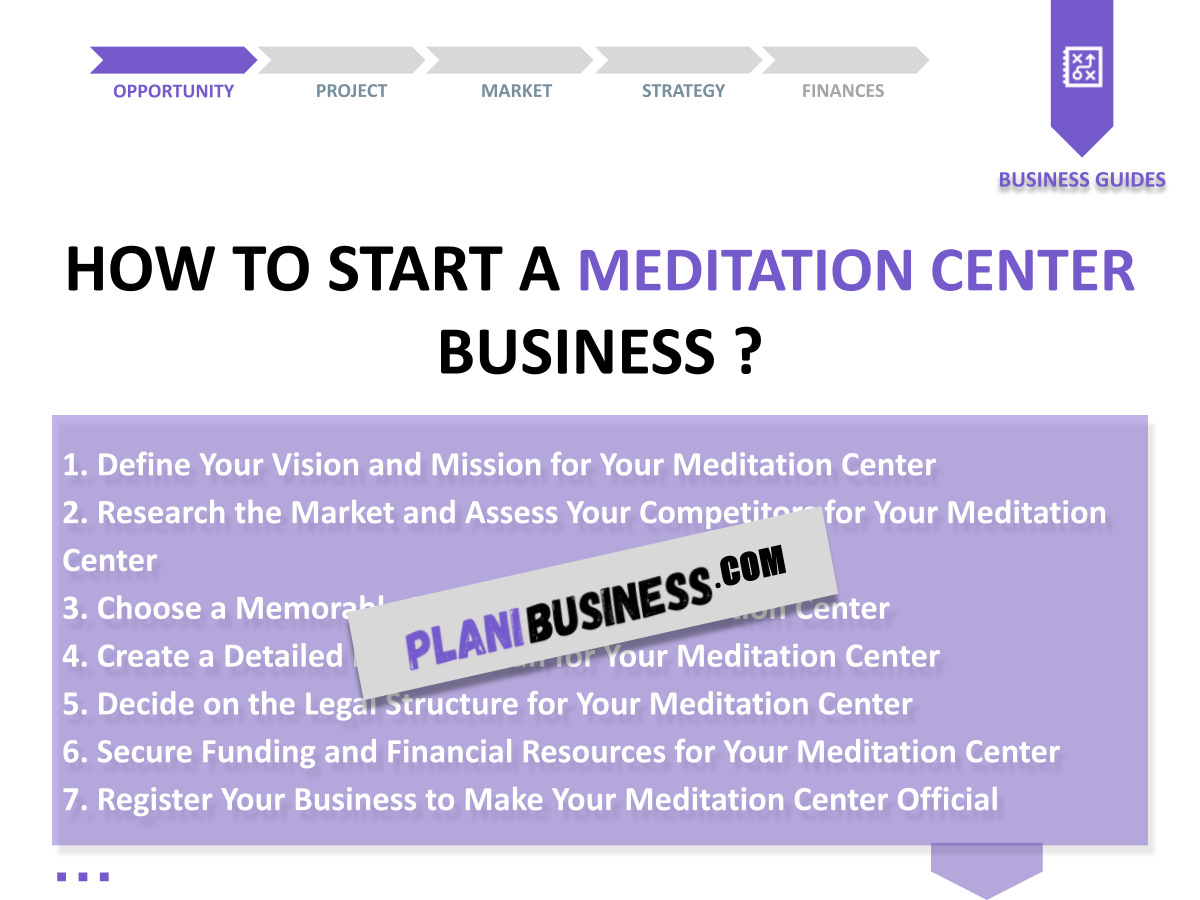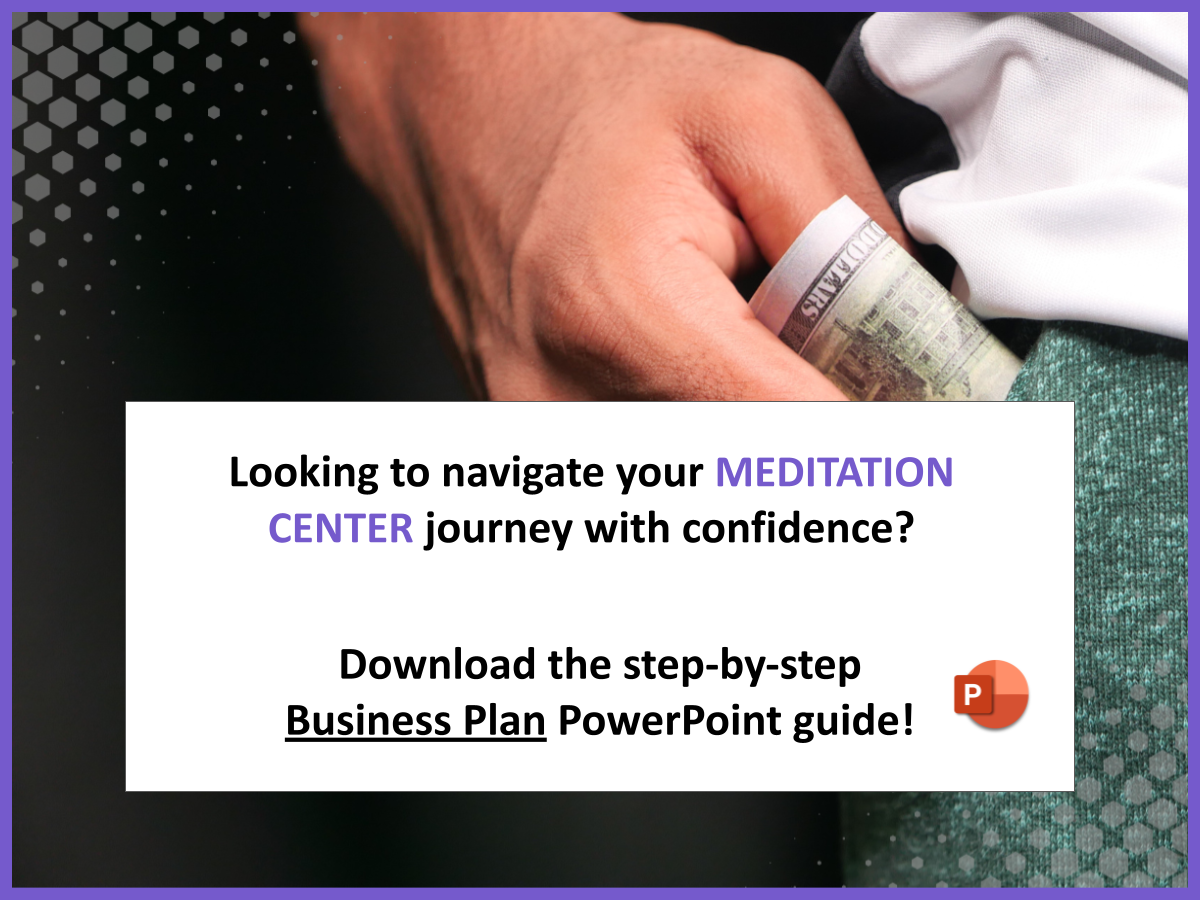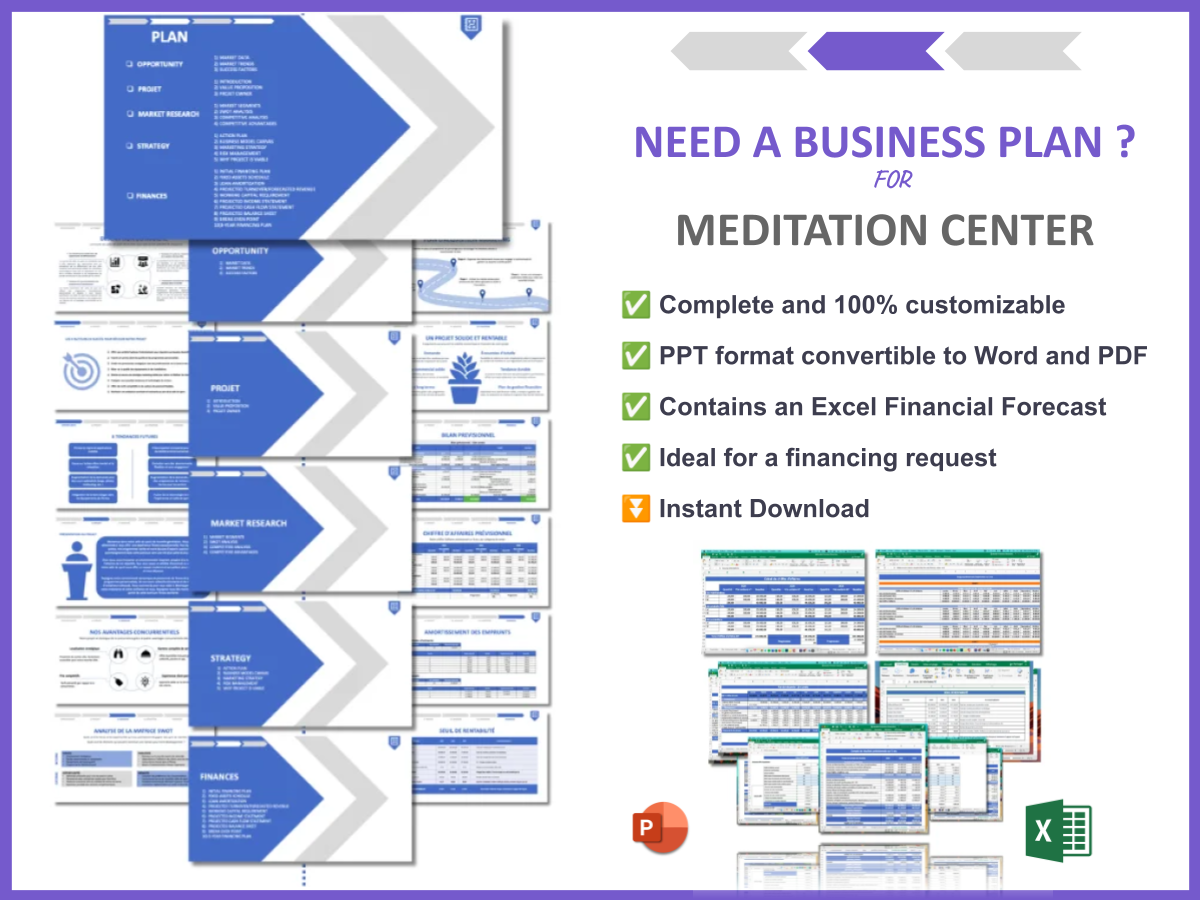Are you thinking about starting a Meditation Center? You’re not alone! In recent years, more people are seeking tranquility and mindfulness, leading to a surge in meditation centers worldwide. The demand for places where individuals can unwind, rejuvenate, and connect with themselves has never been higher. In this article, we will explore how to start a meditation center and cover everything from the initial idea to marketing strategies.
Before diving into the logistics, take a moment to think about what you want your meditation center to represent. Defining your vision and mission is crucial as it sets the tone for everything else you will do. Ask yourself:
- What values do you want to promote?
- Who is your target audience?
- What unique offerings will you provide?
Having a clear vision will guide your decisions moving forward. It’s like having a compass that points you in the right direction! For instance, if your mission is to promote mental wellness, you might focus on mindfulness practices and community-building activities that foster a sense of belonging. This clarity will help you communicate effectively with potential clients and stakeholders.
1. Define Your Vision and Mission for Your Meditation Center
Establishing a strong foundation with a defined vision and mission is the first step in how to start a meditation center. Here are some unique thoughts to consider:
- Create a mission statement that resonates with your core values. - Visualize the atmosphere and experience you want to create. - Consider the long-term impact you wish to have on your community.
Remember, your vision should inspire both you and your future clients. It’s about creating a sanctuary for peace and growth. You might find it helpful to write down your ideas and even share them with friends or family to get feedback. This initial brainstorming can spark creativity and lead to a more refined vision.
2. Research the Market and Assess Your Competitors for Your Meditation Center
Understanding the landscape is crucial when you’re planning how to start a meditation center. You need to know who your competitors are and what they offer. Here’s how you can conduct effective market research:
- Identify existing meditation centers in your area.
- Analyze their strengths and weaknesses.
- Look at their pricing, services, and customer reviews.
Here’s a simple table to illustrate how you might analyze competitors:
| Competitor | Strengths | Weaknesses |
|---|---|---|
| Local Yoga Studio | Established client base, variety of classes | Limited focus on meditation |
| Wellness Center | Diverse wellness services | High competition |
By analyzing your competitors, you can find gaps in the market that your meditation center can fill. This research helps you position yourself effectively. For example, if you notice that no one offers specialized classes for beginners, you could create a niche for your center. Understanding what others are doing right and wrong will give you valuable insights as you move forward.
3. Choose a Memorable Name for Your Meditation Center
Your center’s name is the first impression potential clients will have. Make it count! A strong name can evoke feelings of peace and tranquility, which are essential in the realm of meditation. Here are some tips to consider when brainstorming names:
- Is it easy to remember and pronounce?
- Does it reflect the mission and vision of your center?
- Is the domain name available for your website?
To help you brainstorm, consider creating a list of words that resonate with the essence of meditation, such as:
- Serenity - Harmony - Tranquility - Mindfulness - Enlightenment
Once you have a list, try combining different words or adding unique modifiers. For example, “Serenity Space” or “Tranquil Minds.” This creative process can lead to a memorable name that encapsulates the spirit of your center.
4. Create a Detailed Business Plan for Your Meditation Center
A solid business plan is essential when figuring out how to start a meditation center. It serves as your roadmap, guiding you through the various stages of your business. Your plan should include:
- Executive Summary: An overview of your vision and goals.
- Market Analysis: Insights from your research on competitors and target audience.
- Marketing Strategy: How you plan to attract and retain clients.
- Financial Projections: Budgeting and expected income.
Here’s a simple table outlining the key components of a business plan:
| Section | Description |
|---|---|
| Executive Summary | A snapshot of your business and its goals. |
| Market Analysis | Details about your target market and competition. |
| Marketing Strategy | Plans for promoting your center and attracting clients. |
| Financial Projections | Estimated costs, revenues, and profitability timeline. |
I recommend checking out this business plan template for Meditation Center. It’s super detailed and can save you a ton of time! Having a well-structured business plan not only helps you stay organized but also makes it easier to secure funding and communicate your vision to potential investors.
5. Decide on the Legal Structure for Your Meditation Center
Choosing the right legal structure is vital for your center’s future. It can affect everything from your taxes to your personal liability. Here are some common options you can consider:
- Sole Proprietorship: This is the simplest form of business structure. You have complete control, but you also bear all liabilities.
- Limited Liability Company (LLC): This structure offers personal liability protection while allowing for flexible management and tax benefits.
- Corporation: A more complex structure that protects your personal assets but comes with more regulations and taxes.
Here’s a quick comparison of these structures:
| Structure | Pros | Cons |
|---|---|---|
| Sole Proprietorship | Easy to set up, complete control | Unlimited personal liability |
| LLC | Limited liability protection, flexible taxation | More paperwork required |
| Corporation | Limited liability, can raise capital through stock | Complex regulations, double taxation |
Consider consulting with a legal professional to help you navigate these options and choose the best one for your specific situation. This decision will play a crucial role in how your center operates and protects your interests.
6. Secure Funding and Financial Resources for Your Meditation Center
Starting a meditation center can require significant investment. It’s essential to explore various funding options to ensure you have the financial resources you need. Here are some ways to secure funding:
- Personal Savings: This is often the first option for many entrepreneurs. It gives you complete control over your finances.
- Bank Loans: Traditional loans can provide a lump sum, but they require a solid business plan and proof of repayment ability.
- Investors or Crowdfunding: Platforms like Kickstarter or GoFundMe can help you raise funds from individuals who believe in your vision.
Creating a budget can help you keep track of expenses and ensure you’re on the right path. Here are some expenses you should consider:
- Rent for your location
- Equipment and supplies
- Marketing costs
- Staff salaries
By identifying your funding sources and preparing a detailed budget, you can significantly reduce financial stress and focus on making your center a reality. Remember, having a financial cushion can also provide peace of mind as you navigate the early stages of your business.
7. Register Your Business to Make Your Meditation Center Official
Once you have your plan and legal structure in place, it’s time to register your business. This step is crucial for making your Meditation Center official and ensures you comply with local regulations. Here’s a simple checklist to guide you through the registration process:
- Choose a Business Name: Ensure it’s unique and resonates with your center’s mission.
- File Necessary Paperwork: Depending on your location, this may include forms for business registration and any permits.
- Pay Registration Fees: Be prepared for some costs associated with officially registering your business.
In many regions, you may also need to register for a Doing Business As (DBA) name if your center operates under a name different from your legal business name. This helps in branding and marketing efforts. Additionally, registering your business can provide credibility, which is essential when attracting clients.
8. Obtain Necessary Tax Identification Numbers, Licenses, and Permits for Your Meditation Center
Compliance is key when starting your Meditation Center. You’ll need to secure the appropriate tax identification numbers, licenses, and permits. Here’s a breakdown of what you may need:
- Employer Identification Number (EIN): This is required if you plan to hire employees. It’s essentially your business’s Social Security number.
- Business Licenses: Depending on your location, you might need specific licenses to operate a wellness or meditation center.
- Health and Safety Permits: If you offer classes, you may need permits ensuring that your space meets local health and safety regulations.
It’s important to check with your local government or a business advisor to understand the specific requirements for your area. This may seem overwhelming, but ensuring compliance can save you from potential legal issues down the line. Plus, having all the necessary documentation in place builds trust with your clients, showing that you take your business seriously.
9. Apply for Business Insurance Coverage for Your Meditation Center
Protecting your investment is crucial when starting a Meditation Center. Having the right insurance coverage can safeguard you from unexpected events and liabilities. Here are some types of insurance you should consider:
- General Liability Insurance: This covers claims related to injuries or accidents that occur on your premises.
- Professional Liability Insurance: Also known as errors and omissions insurance, this protects you against claims of negligence or inadequate services.
- Property Insurance: This covers your physical assets, such as equipment, furniture, and the building itself, against theft, fire, or damage.
To help you understand your options better, here’s a simple table comparing the types of insurance:
| Type of Insurance | Coverage | Why It’s Important |
|---|---|---|
| General Liability | Injuries and accidents | Protects against lawsuits and claims |
| Professional Liability | Negligence and errors | Covers legal fees and settlements |
| Property Insurance | Physical assets | Safeguards your investment |
Consider consulting with an insurance agent who specializes in small businesses to ensure you have adequate coverage tailored to your needs. This investment will give you peace of mind as you focus on running your center.
10. Set Up Your Financial Management Systems for Your Meditation Center
Keeping track of finances is essential for the long-term success of your Meditation Center. A robust financial management system can help you monitor expenses, revenues, and overall financial health. Here are some steps to consider:
- Choose Accounting Software: Programs like QuickBooks or FreshBooks can simplify managing your finances.
- Hire an Accountant: If your budget allows, consider hiring a professional to help manage your books and provide financial advice.
- Set a Budget: Outline your expected income and expenses, and review this regularly to stay on track.
Additionally, consider implementing the following practices:
- Regularly review your financial statements. - Keep personal and business finances separate. - Track all expenses, including small purchases.
By establishing a solid financial management system, you can avoid unnecessary stress and ensure that your Meditation Center operates smoothly. Financial clarity will empower you to make informed decisions and focus on what truly matters—helping your clients achieve peace and mindfulness.
11. Establish Your Brand Identity for Your Meditation Center
Your brand is more than just a logo; it’s the personality of your Meditation Center. A strong brand identity can help you stand out in a competitive market and attract clients who resonate with your values. Here are some essential elements to consider:
- Create a Logo: Your logo should reflect the essence of your center—calm, peace, and mindfulness. Consider hiring a designer or using online tools to create something unique.
- Develop a Color Scheme: Colors evoke emotions. Soft blues and greens can create a calming effect, while warm colors can evoke a sense of community.
- Craft Your Mission Statement: This statement should communicate your purpose and values. It will guide your marketing efforts and help clients understand what you stand for.
Here’s a simple table to illustrate how these elements come together:
| Brand Element | Purpose | Example |
|---|---|---|
| Logo | Visual representation of your brand | A lotus flower symbolizing peace |
| Color Scheme | Sets the emotional tone | Soft blues and greens |
| Mission Statement | Communicates your purpose | “To provide a sanctuary for inner peace” |
Investing time in developing your brand identity will help create a memorable experience for your clients, fostering loyalty and community around your center.
12. Develop a Professional Website for Your Meditation Center
In today’s digital age, having a professional website is non-negotiable. Your website acts as a virtual storefront and is often the first point of contact for potential clients. Here’s how to create an effective website for your Meditation Center:
- Include Information About Classes and Services: Clearly outline what you offer, including class schedules and pricing.
- Contact Details: Make it easy for clients to reach you. Include a contact form, phone number, and email address.
- A Blog to Share Insights and Tips: Regularly updated content can improve your SEO and position you as an authority in the field.
Consider these additional features to enhance your website:
- User-friendly design: Ensure easy navigation. - Mobile compatibility: Many users will access your site via their phones. - Testimonials: Showcase positive feedback from clients.
By creating a professional website, you’ll not only attract clients but also establish credibility in your community.
13. Market and Advertise Your Meditation Center
Once everything is set up, it’s time to spread the word! Effective marketing strategies are crucial for attracting clients to your Meditation Center. Here are some approaches you can consider:
- Social Media Campaigns: Utilize platforms like Instagram and Facebook to showcase your center, share client testimonials, and promote events.
- Community Events: Host free workshops or open houses to introduce people to your center and its offerings.
- Partnerships with Local Businesses: Collaborate with local gyms, wellness shops, or health practitioners to cross-promote services.
Here’s a simple table to summarize effective marketing strategies:
| Strategy | Benefits | Implementation Tips |
|---|---|---|
| Social Media | Increases visibility and engagement | Post regularly and interact with followers |
| Community Events | Builds local awareness and trust | Offer free sessions to attract interest |
| Partnerships | Expands reach and audience | Choose partners that align with your mission |
With the right approach, you can create a thriving community around your Meditation Center. Remember, marketing is an ongoing effort, so continually assess your strategies and adapt as needed to meet your goals.
Conclusion
Starting a Meditation Center is an exciting journey that can lead to a fulfilling career while helping others find peace and mindfulness. From defining your vision to implementing effective marketing strategies, each step is crucial in building a successful center. Remember to invest time in research, planning, and establishing your brand identity, as these elements will serve as the foundation for your business.
As you move forward, consider diving deeper into specialized topics such as creating a SWOT analysis for your center by checking out this informative article on how to create a SWOT Analysis for Meditation Center. Additionally, if you’re looking for guidance on promoting your services, don’t miss our article on How to Build a Meditation Center Marketing Plan? With Example. These resources will equip you with valuable insights to enhance your journey in establishing a thriving meditation practice.
FAQ
- What is the first step in starting a meditation center?
The first step is to define your vision and mission. This helps set the tone for your center and guides your decisions moving forward. - How much does it cost to start a meditation center?
The costs can vary widely depending on location, size, and offerings, but you should budget for rent, equipment, insurance, and marketing. It’s essential to create a detailed financial plan. - Do I need a special license to operate a meditation center?
Yes, depending on your local laws, you may need to acquire specific licenses and permits. It’s important to check with local authorities to ensure compliance. - What types of classes should I offer?
Consider offering a variety of classes such as beginner meditation, mindfulness practices, and specialized workshops. This diversity can attract a broader audience. - How can I market my meditation center?
Use social media, community events, and partnerships with local businesses to promote your center. Building an online presence through a professional website can also help. - What should I include in my business plan?
Your business plan should include an executive summary, market analysis, marketing strategy, and financial projections to guide your operations and secure funding. - Is it necessary to hire staff for my meditation center?
Depending on the scale of your center, hiring instructors or administrative staff may be beneficial. This allows you to focus on managing the center and developing programs. - How can I create a welcoming environment in my meditation center?
Focus on aesthetics, such as calming colors, comfortable seating, and soothing decor. Creating a serene atmosphere can enhance the meditation experience for your clients. - What are some common challenges faced when starting a meditation center?
Common challenges include finding the right location, building a client base, and managing finances. Planning and thorough market research can help mitigate these issues. - How can I assess the success of my meditation center?
Monitor client feedback, attendance rates, and financial performance regularly. Setting specific goals and measuring progress can help you evaluate your center’s success.







